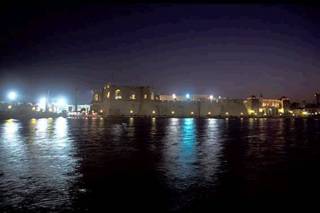Read the article first, and then my response.
The New York Times > Reuters > International > Libya Tells Iran: Be Like us and Comply with IAEA
That's a good one.
Let's clarify a couple of significant differences in the positions of Iran and Libya, shall we?
First, Iran does not suffer from dillusions of grandeur. It IS actually a much larger country, with a larger population, more natural resources, including maybe 3X the proven petro-reserves Libya has, and an educated percentage of the population that CAN develop technologically (for peaceful or other ends). Iran's Islamic government was instated after a nation-wide revolution that overthrew a US appointed puppet that made it very clear that the common Iranians were not really his priority. Not everyone that revolted was for an Islamic government, for sure, but the fact that this government followed a popular revolution is important.
Iran is also strategically much more threatening to US interests in the region...actually regions since Iran straddles both the Middle East and Central Asia. I think it's safe to say that Iran's military is probably off than Iraq's was after a decade plus of sanctions. Geographically, Iran borders Turkey, Iraq, Afghanistan, Turkmenistan, Pakistan, and Russia. Iran has also proven that it will put it's money where its mouth is regarding the Palestinian-Israeli conflict.
On the other hand, Libya has a population of 6 million (a liberal estimate), over 90% of the country is desert (hardly a chance for guerilla warfare except in the eastern green mountain area). Libya does have substantial amounts of proven oil reserves, but let's put this in perspective: Saudi Arabia's 261.7 billion barrels of proven reserves tops the list of the top 10 countries; Iran is third with 100.1; Libya is number nine, with 30.0 billion barrels of proven oil reserves. What this means is that Libya doesn't have as much negotiating leverage as oil is its number one export AND competition is tough. In game theory speak, it is more beneficial for Libya to cooperate than to risk not cooperating...unlike Iran.
Greatest Oil Reserves by Country, 2003
The 1969 Coup and the subsequent domestic (read oppressive) actions of the Free Generals did little to advance Libyan's technological opportunities; rather, a steady trend of the 'brain drain' phenomenon continued throughout the 70s and 80s as many who were educated abroad with the intent of returning to benefit their homeland remained abroad due to the political situation.
There are those who hail the 69 Coup as bloodless. Yes, in 1969, it was bloodless. Against the King Idris, it was bloodless. Against the broader population, especially those the regime declared enemies of the state (like the 'enemy combatant' status) in the decades to come, it was not bloodless. Finally, violence is not always bloody. I'll write more on that theme later though.
The top-down establishment of the current government of Libya leaves much to be answered regarding where the loyalties of Libyans lie. Its popular stability is a wild card while Islamic governance seems to me, at least, to be gaining popularity along with other calls for increasing (secular) democratic participation.
To continue, Libya is strategically significant, but not in the same way as Iran. The politics of the last few years indicate that the spotlight, at least for the US, is on Central Asia and the Middle East proper rather than Africa or North Africa. Libya has clout in Africa, a continent full of unstable governments easily bought out by western/US corporations to the detriment of their people. Yes, the same thing is occuring in Central Asia and the Middle East, but the people of those regions have proven far more resistant. Until the US turns its head to Africa, Libya's position of leadership is not of the utmost concern.
Finally, we turn to the issue of Israel. The world has heard plenty of anti-Israeli statements from Libya throughout the years, including willingness to lead a new war if only Egypt opened its borders and other Arab nations contributed militarily. Good one again, I say.
Unlike Iran's links to Hizbollah, a group credited with kicking Israel out of Lebanon, Qadaffi's actions prove either unwillingness or inability to continue supporting the Palestinians. Libya's share of a fund established by the League of Arab States to support Palestinians has not been paid for a few years now (unless my knowledge is out-dated, and I will research this a little later). 30,000 Palestinians who were expelled from Libya in the late 90s, to make some incomprehensible point to either the world or Arabs or Israel, were forced to set up a refugee camp between the Egyptian and Libyan border. In sum, Libya is no threat, politically or militarily, to Israel.
Now, I love my country and am happy that changes are underway, but I will NOT allow a complete cover-up of the past simply because the US wants to use Libya as a trophy for its bloody ambitions in the Middle East.









